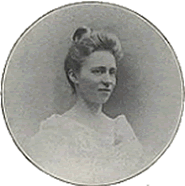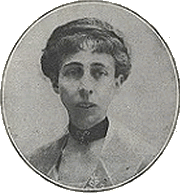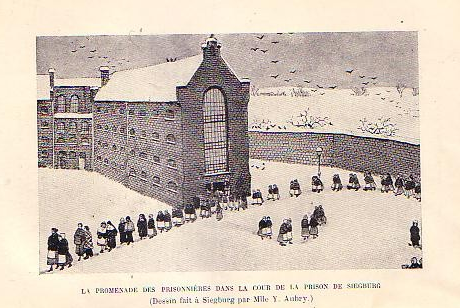| Organe de presse | ||||
| HOME | ||||
| Droit Fondamental | |
||||
 |
| Louise
de Bettignies |
| 15/07/1880
- 27/09/1918 |
| Détenue
à Siegburg
|
No improvement since Siegburg 1914-1918
Jacqueline de Croÿ - 16 janvier 2010
 |
|
Marie
de Croÿ |
26/11/1875
- 20/06 1968 |
| Détenue
à Siegburg. |
We discover with
amazement that there was more humanity to the sick inmates of the
prison Siegburg and the hospital Cologne in Germany during the 1rst
World War than in the Belgian and French prisons today. Judge for
yourself the evidence that has left us the Princess Marie de Croÿ,
sentenced to 10 years hard labour on October 11, 1915 and Louise de
Bettignies, whose sentence to death March 16, 1916 was commuted to
hard labour for life.
Political convictions
The administration of the Siegburg prison classed the detainees into "political prisoners" and "civil prisoners". The EU prohibits the political detentions, but does not protect from false miscarriages of justice. The European Court of Human Rights does not guarantee the right to survive the conditions of detention, because it takes from two to eight years to judge the case, according to the emergency they grant it. Unlawful detentions can thus legally be longer than two world wars and serial genocides.
Belgium, France, Switzerland, Holland and Portugal
are unilaterally exposed for false miscarriages of justice based on
slander, in order to cover corruption. The political convictions are
then Made heavier by infamy in order to ruin the reputation of people
who have simply done their duty, while some the German warders were
saying to the political prisoners: "In your place I would
have done the same."
Extortion of confessions
In 1914-1918, the abuse reserved for the extortion of confessions which depended on the army, under the Ministry of War. They currently rely on the psychosocial services of the prisons under the Ministry of Justice. Prisoners of war and doctors suspected the use of drugs they described as "exciters which prevented from thinking calmly". The effect described corresponds to the effect of amphetamines, which deliver from the concept of danger, give the feeling of being a genius, which drives to talk nonsense. Marie de Croÿ has fasted throughout her trial, to make sure not to expose members of her Resistance network.
Today, all is done to eliminate witnesses of corruption
by false confessions and by inciting them to suicide before the prosecution
or the appeal to the European Court of Human Rights. These false confessions
have to "clear" the corrupted state.
The conditions of detention are decided by the psychosocial services of the prisons. The drugs are replaced by deprivation of sleep, which affects the reflection and that can also have hallucinogenic effects. The prisoners can be woken-up every quarter of an hour under the pretext of "suicide risk" or to "check if they are not dead".
The concept of 1914-1918 to debase the detainee
has seriously worsened. The invader was said to be the victim resistant,
who was at the worst, treated as a murderer for having helped an Allied
soldier. Today, the psychosocial services of the prisons may, under
the pretext of "security measures" and call for
barbaric practices such as a rape called "full search",
by a finger in the vagina for women and in the anus for men. The only
time the prisoner was forced to undress at the prison of Siegburg
was when they arrived to take a bath.
Sentences
The German procedures were very quick and sentences
very heavy, even if they were limited to the time of the war. Marie
Linthout was sentenced to 8 months in prison for having said "dirty
Hun." Marthe Flavigny was sentenced to 3 years for having
hidden her 18-years-old son. A family of six persons, including the
75-years-old grandmother were sentenced to 15 years in prison for
having hidden an Englishman, etc... The alleged facts were real, except
for Edith Cavell, shot for spying when she did nothing more than Marie
de Croÿ.
Marcel Vervloesem has exposed with his NGO the corruption, which covers organised paedo criminality in the region of Antwerp since 1988. Belgium let the first cabal to destroy that man last from 1992 to 1999. This cabal was ridden by a second cabal by children of the first detractors. That judgment was object of delaying tactics from 1998 to 2008. The European Court of Human Rights has eight extra years to determine the legality of the proceedings. It might take him 24 years before getting justice, for false accusation.
France and Switzerland use psychiatrists to declare
insane those who complain about corruption, which allows to steal
billions of dollars every year and even cover-up murders. An French
expert, known for being addicted to the core, has even been designated
to clear assassins by a psychiatric analysis of the dead man. He arrived
at the conclusion of suicide.
Release for good behaviour
"You're here for ten years, but if you
behave well, you can expect from our Emperor the shortening your sentence,"
said an official from the prison Siegburg to Princess Marie,
after having read her conviction. In principle, prisoners of the 21st
century can get a parole for good behaviour, after the third sentence
in Belgium, after the half of the sentence in France. In practice,
psychosocial services of the Department of Justice have the authority
to keep inmates in prison beyond the sentence to which they were convicted,
and abuse it.
Problems of daily life
The food was not a major problem in 1915. At 7
o'clock in the morning, there was coffee without sugar and milk. At
midday, lunch with a vegetable soup, a bit of meat and a piece of
black bread. At 4 o'clock, tea with a hot drink, a piece of cheese,
sauerkraut, half a herring or salted cod could replace the meat of
lunch. Dinner was oatmeal or barley beaded soup. In 1917, all were
suffering from hunger, including the guards, who had the same treatment
as the prisoners. The potatoes were requisitioned to take the alcohol
needed to manufacture ammunition.
Prisoners of Siegburg were suffering from cold and lack of light at the fall of the night. The great breakthrough in a century is the heat and the electricity in the prisons. The food is still insufficient, but the prisoners who can afford it can buy some at the canteen.
The incoming and outgoing mail was censored at
the prison Siegburg, but the packages were allowed. Inmates can not
receive packages in Belgian prisons. We know from the guards that
the incoming mail of certain prisoners is currently photocopied. Letters
and postcards can be retained. Inmates doing the housework have found
letters addressed to other inmates in the waste paper basket of the
administration. Not a single letter from Marcel Vervloesem prison
bears the postmark of the town where he is detained.
Psychiatry in prison
The psychiatric patients were not maintained in
Siegburg, but sent to a specialized asylum. The Princess Marie judged
that the solitary confinement was "extremely painful" and
instigator of the loss of mind of the more fragile inmates. She was
regularly called to boost the morale of the prisoners in whom they
had observed the first signs of madness, which would be unimaginable
in a Belgian prison. The law no more allows keeping psychiatric patients
in prison. These patients have all-the-same been removed from institutions
"for economic reasons", and sent to prison in 2006. They
represent 50% of prison overcrowding. In 2010, prisoners in good health
are deported by force to the prison of Tilburg, in Holland.
Dungeon
The description of the dungeons of the prison Siegburg
is identical that of "observation cells" of the prison Turnhout.
These "cells smaller than others, and whose high-placed window
is covered with a grating that allows only a gloomy day."
Louise de Bettignies has been sent to the dungeon for having initiated
the prisoners' refusal to produce ammunition that was to be used against
their own country, which was a violation of the Hague Conventions.
She has earned that right from the German authorities. The psychosocial
services of the prison of Turnhout sent Marcel Vervloesem to the dungeon
and banned from going to church, under the pretext of "protection
measures".
The authority and assistance to the prisoners
The German Governor General von Bissing answered the Countess de Merode-Westerloo on what he describes as the "so-called inhuman treatment inflicted to the Princess Marie de Croÿ", expressing his "deepest astonishment that a princess of German blood dares criticize in such terms the measures taken by the German authority". He made what the Belgian government calls a "thorough investigation" which has come to the conclusion that "the Princess was treated with all possible consideration." Her jaws were decalcified and she could no longer eat. She only weighed 42 kilos.
The German Interior Minister met Marie de Croÿ
in her cell at Siegburg within the framework of a tour of inspection
of all the prisons. He very politely asked her if she had some complaints.
She asked if he thought it was fair that political prisoners, all
honourable women, were incarcerated with the civilian prisoners. Some
were violent women who had killed with their own hands. Others had
shameful disease. The minister looked embarrassed. Soon after, the
women's quarters of the prison Siegburg was reserved for political
prisoners. The detention condition could be softened. They could,
for example, walk two by two, allowing them to talk to each other,
since there was no risk of quarrels.
A century later, the Minister of Justice of Belgium does not condescend to answer the protests of another one of those damned Princesses de Croÿ, about the inhuman treatment to Marcel Vervloesem in one of his prisons. He probably is also "deeply surprised that a princess of Belgian blood dares criticize in such terms the measures taken by the Belgian authority."
The minister has condescended, in his magnanimity,
but above all by fear of Karl Zero, a French journalist, to have Marcel
Vervloesem transferred to another prison to grant him "more
humane conditions of detention." The minister ordered a
"thorough investigation", which had concluded that the Belgian
authority "repeats its full confidence in its psychosocial
services" that prohibit medical care that the German Department
of war would have authorized a century earlier. There is no possible
dialogue with the Department of Justice, who even answer to reporters:
"we do not communicate about Mr Vervloesem".
Question of life or death
The doctor of the Siegburg prison in 1914-1918
was nicknamed "Dr. Get Out" for his way to shorten the consultations.
The German ministry of war gave the authorisation for the prisoners
to have surgical intervention in a hospital if they endangered their
lives by fear of being operated in the prison infirmary, where the
poor sanitary conditions hardly left any chance of survival.
"Doctor Get Out" requested the hospitalization of Princess Marie to the Department of War, but the response was delayed of three weeks. A prison official told her: "These Prussian want to give you time to die here. Do not make them this pleasure." She was hospitalized July 4, 1917 and released at the end of the war, November 13, 1918. She had such excellent treatment that she was able to re-offend during the 2nd World War and she died at age 92.
Louise de Bettignie was operated of a tumour at
the infirmary of the Siegburg prison on April 15, 1918. The guards
would bring her flowers, lilacs and Forget-me-not. Even the terrible
Frau Ruge brought her the flowering twig of an apple tree.
Louise Bettignies was transferred July 25 to a hospital in Cologne,
where she died two months later, on September 27, 1918.
Today, the detainees of the Belgian prisons can be hospitalized only in a coma, one foot shackled to hospital bed, only if their hope of survival is limited to three days. Even then, the Minister of Justice may oppose it. Marcel Vervloesem has been hospitalized seven times to the point of death, each time returned to prison by denying him the treatment that was necessary to prevent the following hospitalization. He was shackled, as an animal, 591 hours "for health reasons".
The prisoners of war were not shackled in the German hospitals. The door was just locked. The door was just locked. One feels a genuine gratefulness of sick prisoners for the kindness and the general desire to save their lives.
Today, we only see the will to kill sick prisoners,
or push them to suicide with a coldness and cruelty that goes beyond
the memory of Siegburg 1914-1918. The psychosocial services do not
either bring flowers, nor encouragement. They have carte blanche
to throw a book at the head of a sick prisoner, telling him he will
not get the medical treatment ordered by the prison doctor, as long
as he does not make false confessions, to clear the ministers who
have covered-up the false miscarriages of justice dictated in view
to kill him.
Independence of the magistrates
The judges have more the freedom of the German martial courts of the 2nd war. The officer who sentenced Mary de Croÿ to ten years hard labour for having recurred in 1940-1945 stood at attention before her and said: "You have done your duty, Princess." It is hard to imagine a judge standing at attention in front of Marcel Vervloesem saying he has done his duty for having preferred death in prison than silence about a crime against humanity. His last condemnation to die in prison was dictated by the department of justice, to a magistrate who based her decision on a document missing from the dossier because the Department of Justice had refused to join it to the dossier.
A new judge was in charge to judge whether he should
be maintained in detention. Our Minister of Justice has excelled in
inventiveness to assassinate "legally" this prisoner who
survives only by serial miracles. The medical services have found
a worsening of the cardiac failure of Marcel Vervloesem. He was then
imposed to be judged outside his jurisdiction to follow the Antwerp
judge of sentences implementation to Hasselt, rather than picking
a date when this judge would be in his own jurisdiction. This was
allowing condemning him legally to ten days of hell, to which he will
again only survive by miracle.
He was handcuffed in a cage van without heat for a day trip to be taken to the prison of Hasselt, after having stopped in all the prisons. He was then imposed a strict solitary regime, which deprives him from the daily blood tests which are to alert the doctors if he is three days away from his death, so he can be granted his right to die shackled in a hospital. Two administrative mistakes prolongs the deprivation of his rights of prisoners: the “forget” to transfer his money, denying him access to telephone or post stamps, then they “forget” to bring him back to the prison where the regulation cannot deny him his rights.
As in the Siegburg prison, the prisoners, even
the real bandits, help each other in a moving manner. Thanks to that,
we know that the sentence implementation judge has reviled the psychosocial
services and demanded the documents missing in the file. It is the
first judge in 22 years of persecution of Marcel Vervloesem who has
wanted to pronounce a judgment on the basis of a complete dossier.
We do know no more yet, but a sole fair magistrate in a world where
the guarantors of democracy have the reputation of having brains and
emotions dehydrated by drugs, is giving hope to an entire country.
The Judge said Marcel Vervloesem would have prison leave. His life is in great danger because the governement opposes that a doctor may treat him. If you are told tomorrow that he has committed suicide, keep in mind that he was murdered.
They said that the blood of Edith Cavell would
mark those who had made her shot on the basis of false charges. All
the German people paid it by a reputation of murderers, at a time
its authorities were more human than the Belgian ones. The blood of
Marcel Vervloesem will mark those who have made his blood shed afloat
by denying him medical treatment. His almost mystical survival to
so many attempted murders whereas he has fought all his life to save
children from sexual exploitation leaves one solution: free him alive
and leave him in peace.
